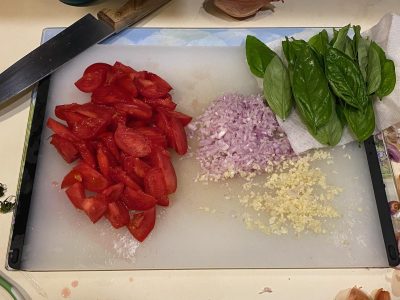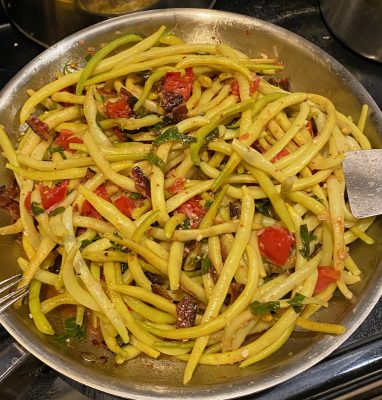According to the National Gardening Association, one quarter of U.S households in 2019 planted vegetable gardens, which surprises the heck out of me and gives me hope. What I’ve seen as niche turns out to be ordinary and widespread. There’s a lot of room for difference in that sea of American growers, and with that in mind, I feel there’s room for me to express that I planted green beans with a single-track mind towards turning them into Martha Rose Shulman’s gussied up version of casserole. It feels weird to write, because Alice Waters’ farm-to-table ideal haunts my gardening, suggesting that the highest enjoyment of your produce is found in having it fresh and ‘true to its nature.’ I felt slightly pathetic: is there something wrong with me that I basically just want to blanch these and cover them up with bacon, gruyere, alium etc.? With something like 40 Beurre de Rocquencourt and Calima plants, I have a veritable forest of legume-tangle, teeming with potential. After a watering session devolved into an all-hands-on-deck effort to harvest, and our bag was filled with over 4 pounds of beans–equal parts Beurre and Calima–my mind was swirling with ideas. Looking at all this yield in the flesh, there was no way I could now go on and make casserole for days. There must be something.
Luckily, my sister, always a proponent of Food and Wine recipes, found one for the yellow half of our harvest: “Warm Yellow Wax Beans in Bacon Vinaigrette.” We were blown away by the aroma, texture, and freshness of the dish. Initially wary of all the acidic ingredients on our counter, we discovered that it was very much needed to balance the bacon fat and olive oil and didn’t interfere with the delicacy of the bean flavor. Although it was nearly all vegetable (tomatoes were from Barberry Hill Farm!), the bacon added a heartiness to the dish that made it a satisfying alternative to pasta in 85-degree weather. From prepping to serving, it took only half an hour. In that half-hour, my single-mindedness, my casserole obsessive disorder, was cured. This is what I’ve loved about gardening myself: through the generosity of their growth, I am forced to confront my vegetables for all that they are.
-Will Platt

